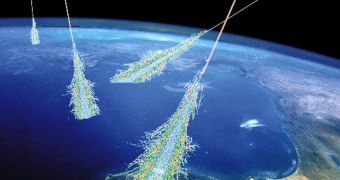In a paper published in the October issue of the journal Astrobiology, researchers from the Blue Marble Space Institute of Science argue that cosmic rays may be preventing the development of life on planets that do not feature the type of protective magnetic shield our planet has.
Here on Earth, the rotating molten core of the planet generates a powerful magnetic field surrounding the entire world, which wards off charged solar particles, cosmic rays, and a variety of other types of radiations from deep space. However, many planets no longer feature such protection.
Though discovered nearly 100 years ago, cosmic rays continue to amaze and puzzle scientists. Some explanations suggest that these particles, which are capable of traveling near the speed of light, are in fact hydrogen nuclei, or protons, released by distant stars, galaxies, and black holes.
They are constantly pummeling all celestial objects in their path, and planets are no exception. In previous studies, astrophysicists determined that worlds whose iron core stops spinning – like Mars – can suffer extreme damage from exposure to cosmic rays, including losing most of their atmosphere.
Even here on Earth, cosmic rays hit the atmosphere with incredible energies, leading to the creation of muon showers. Muons are elementary particles that are basically very heavy electrons. In addition to being able to reach the surface, muons can deeply penetrate the crust.
In the new study, the BMSIS investigators looked at how this process might influence the development of life in its earliest forms on extrasolar planets. “If the radiation dose is too high, then life as we know it cannot exist,” says Dimitra Atri, who is a physicist at the Institute.
The depth of a planet's atmosphere and the strength of its magnetic field were found to be the deciding factors in the influence that cosmic rays have. While many researchers suggest that the magnetic field is the most important element, this is not what the study determined.
“We found the thickness of a planet's atmosphere is a much more important factor in determining a planet's radiation dose,” Atri explains for Astrobiology Magazine. The team simulated many magnetic field intensities and atmosphere thicknesses for this investigation.
“If you took the Earth and you completely removed the magnetic field, the radiation dose rate will increase by two, which is a big increase, but it would still have very small effects, and would not have any effects on us,” the team leader explains.
“However, if you keep the magnetic field and decreased the atmosphere so it is a tenth as thick, the radiation dose will increase by more than two orders of magnitude,” Atri concludes.

 14 DAY TRIAL //
14 DAY TRIAL //